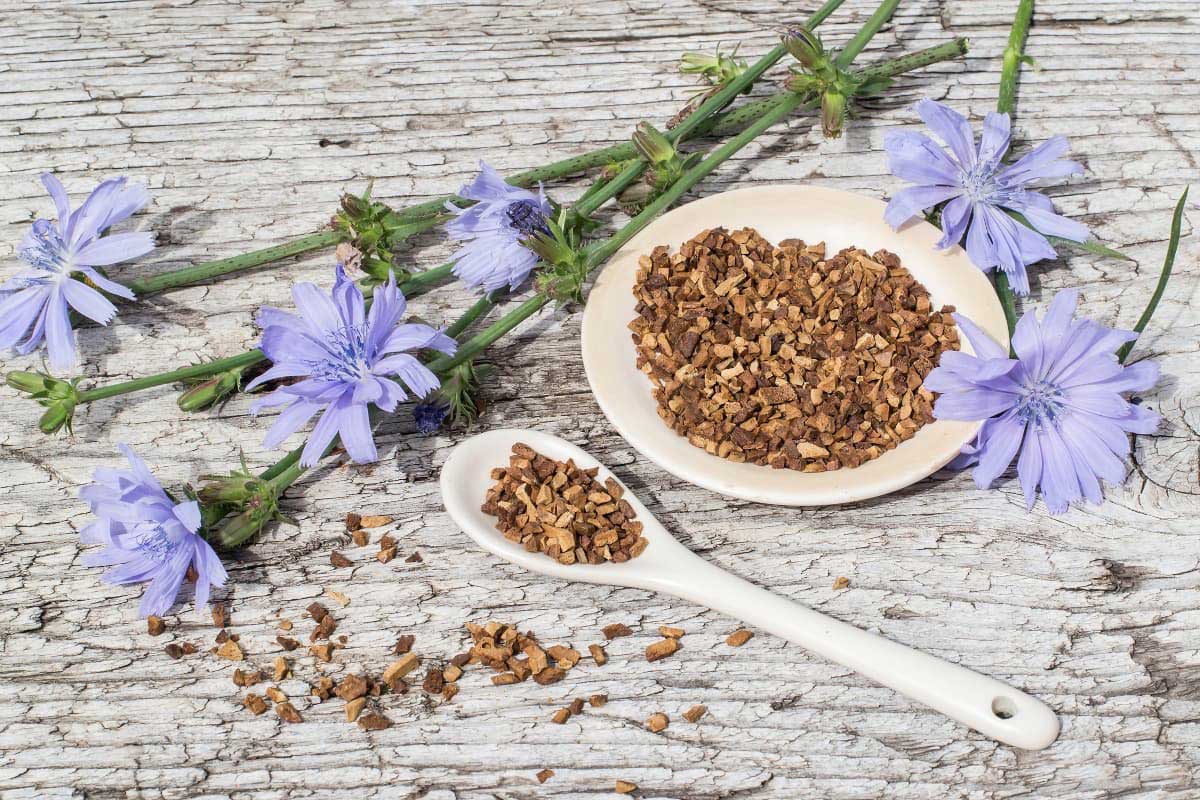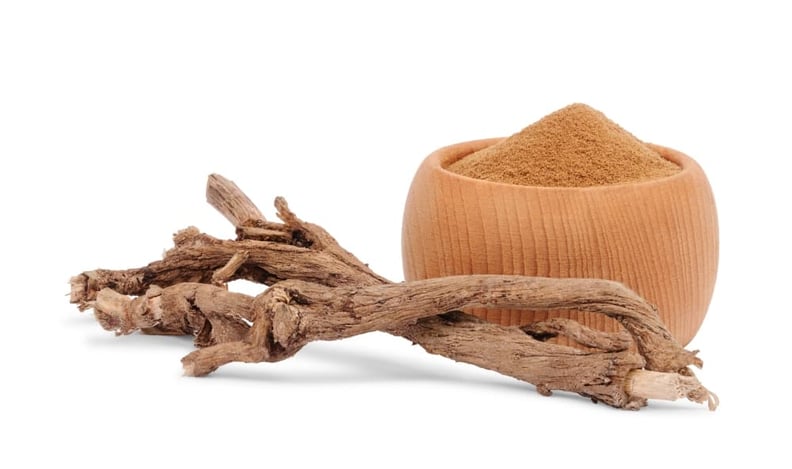
When you are looking for the best dog food, you have to look beyond the labels and see how each ingredient can be beneficial to your dog’s health. This is why chicory is one of our favourite up-and-coming dog food ingredients that you should know about!
What’s this! Another superfood which some of us have probably never even tried ourselves. However, if you have arrived wondering if dogs can eat chicory, the answer is yes, as part of a healthy, balanced diet.
Chicory is an important natural ingredient with many health benefits for pets and it is increasingly being included in dog food for its vitamin, mineral and fibre content.
What is Chicory?
Chicory is a flowering plant, related to the dandelion, and has been used for food and medicinal purposes since Roman times. Many varieties are cultivated for salad leaves and roots, which are baked, ground, and used as a coffee substitute and food additive.
The leaves are quite bitter, you may have heard them called endive before, and surprisingly they are readily available in supermarkets and greengrocers. You will find it harder to find fresh chicory root, but try health food stores that may stock it.
Why is Chicory in Dog Food?
Chicory is a great ingredient to support digestion and to make sure your dog can get as much out of his diet as possible. It's a common ingredient in dog food designed for sensitive digestion and weight loss dog food.
Increasingly, good dog food producers, like Beco Pets, are looking at packing the best nutrients and flavour into their products using natural sustainable sources. Chicory root is a rich source of inulin which is a powerful prebiotic.
Prebiotics feed healthy gut bacteria to aid digestion. For humans, research has linked inulin to several health benefits, such as improving digestive health, helping control diabetes, and aiding weight loss. Similar benefits can also be related to your dog's health.
Inulin also has sweet properties and so can enhance the flavour of the food too, but is low in calories ensuring your dog is not going to become overweight.
When combined with probiotics for dogs, chicory can be the best way to ensure that your dog gets the most out of his food. Other ingredients like pumpkin for dogs can also be beneficial to digestion by regulating the speed of digestion so that your dog's good gut bacteria can properly break down nutrients.
Benefits of Chicory for Dogs
In addition to being a great digestive aid in dog food, chicory is a nutrient-dense ingredient that can help to boost your dog's overall nutrition. Whether you feed a diet containing chicory or are looking to add a little chicory into their diet separately, then your dog will get a boost in the following nutrients.
Folic acid
Folic acid is necessary for normal metabolic functions such as DNA synthesis and red blood cell production.
Vitamin A
This is required for the body’s cells to develop normally and for the immune system to function properly. It is also an essential part of the retina in the eye, and so a key part of vision.
Vitamin B6
Vitamin B6 is important for normal brain development and for keeping the nervous system and immune system healthy.
Vitamin C
Vitamin C is an important antioxidant for dogs that can help reduce potentially harmful free radicals in your pet's body, support healthy ageing, and reduce inflammation. Vitamin C can also support your dog's immune system, improve energy, and help with bladder health.
Potassium
Potassium is vital in a dog’s diet. It affects nerve impulses, heart function, and brain and muscle activity.
Calcium
Dogs need calcium to facilitate proper bone development and prevent health complications.
Phosphorus
Like calcium, a large proportion of phosphorus is found in the teeth and bones. Phosphorus also makes up the outer surface of cells within the body, helps provide cells with energy and is a structural component of DNA.
Magnesium
It helps to maintain normal nerve and muscle function, supports a healthy immune system, keeps the heartbeat steady, and helps bones remain strong. It also helps regulate blood glucose levels and aid in the production of energy and protein.
Fibre
Fibre in a dog’s diet is necessary for good gut and bowel health as it acts as a prebiotic. This means that it provides a medium and a food source for 'friendly' intestinal bacteria. These bacteria aid in the digestion of food and help to prevent harmful bacteria from getting established.
How to Feed Chicory to Your Dog?

So now you can see that there are a lot of health benefits in eating chicory, how should you feed chicory to your dog?
Both the leaves and roots can be eaten safely by your dog. The bitter taste of the leaves may not be as palatable as the sweeter tasting root and cooking of both prior to feeding may improve the taste of the chicory. You can grate raw chicory root onto their normal food or choose dog treats that incorporate chicory.
Chicory powder or flour can also be found at many health stores and added to your pet's diet. It's not the cheapest or most widely available supplement for dogs, so it's easier to look for dog food, dog treats, or digestive supplements for dogs that contain chicory, or inulin sourced from chicory.
If you like to get creative in the kitchen, then you can always add a little chicory to your favourite homemade dog treats. Treats can be both delicious and healthy.
Can Dogs Eat White Chicory?
Yes, white chicory is the leaves of the plant. They are white because they are forced - i.e grown in dark conditions so they can be eaten all year round. It also helps to mellow the flavour as when chicory is left to grow more naturally the leaves can be very bitter. They are known as chicory greens, curly endive or frisée and can still be eaten safely by your dog.
Like many dog-safe vegetables, white chicory, or endives, can easily be fed as a treat or added directly to your dog's meals.
How Much Chicory Can I Feed My Dog?
Like all vegetables, you can give dogs too much of a good thing so it’s important to ensure feeding them chicory is part of a well-balanced diet. Stick to small amounts of chicory, 1/4-1/2 tsp at a time is a good starting point.
Remember that this supplement will feed good gut bacteria, but you must avoid over-feeding it (use less if you are using powdered chicory). If you are unsure how much chicory to feed your dog they can get the same benefits from a pre-made kibble that already contains chicory.
Can Dogs be Allergic to Chicory?
Like any natural substance, a small percentage of dogs may be allergic to the inulin in chicory root. When introducing your pup to it for the first time keep a watchful eye on them and if you notice any of the below symptoms as always, contact your vet for advice.
-
- Itchy skin
- Vomiting
- Diarrhea.
- Hyperactivity,
- Weight loss,
- Lack of energy
- Aggression.
While allergies are possible, it's pretty unlikely that it's a true food allergy. If you notice any of the above symptoms after offering your dog chicory, then it's more likely that you giving your dog a little too much.
Always stick to small portions to make sure the chicory can be used as a digestive aid, not a hindrance.
Boosting Your Dog's Nutrition
When it comes to your dog's health, you shouldn't cut any corners. Finding the right high-quality dog food is important, and the more you know about the ingredients, the easier it is to find the best dog food for your unique dog.
Chicory is becoming a popular ingredient in dog food, especially as we learn more about the importance of good digestion for dogs, but if your dog's food doesn't include chicory, don't stress. Prebiotics are a common ingredient, even if they are not sourced from chicory.
For dogs with sensitive digestion or food allergies, adding a little extra chicory as a meal topper can help improve digestion and reduce skin issues.
Hopefully, you will now have a good idea of why chicory can be a great food to feed your dog safely. Whether you choose to incorporate some into your dog’s diet by using raw or cooked chicory or by buying a prepared kibble that includes chicory as one of its ingredients, you can be sure you are giving your dog the best food to keep them healthy and happy.
Frequently Asked Questions
Can dogs eat chicory?
Yes, dogs can eat chicory in moderation. Chicory is generally safe for dogs and can even offer some health benefits.
What are the benefits of chicory for dogs?
Chicory root contains inulin, a prebiotic fibre that can support digestive health by promoting the growth of beneficial gut bacteria.
Can all parts of chicory be fed to dogs?
While chicory root and its leaves are safe for dogs, it's best to avoid feeding them the flowers or stems. Stick to chicory root as it contains the prebiotic properties beneficial for dogs.
How can I incorporate chicory into my dog's diet?
You can add a small amount of raw, cooked, or steamed chicory root or leaves to your dog's food.
Are there any risks associated with feeding chicory to dogs?
Chicory is generally safe, but like introducing any new food, it's important to monitor your dog's reaction. At first, always feed only a small amount to see how your dog responds.
Can chicory be a substitute for regular dog food?
No, chicory should not replace regular dog food.
.png?width=200&height=66&name=logo%20(1).png)



